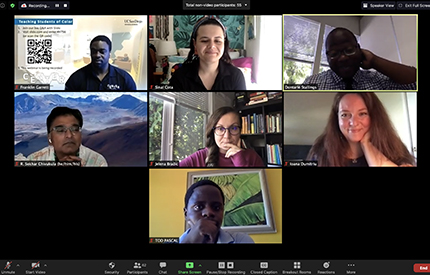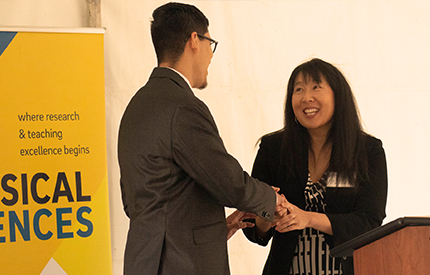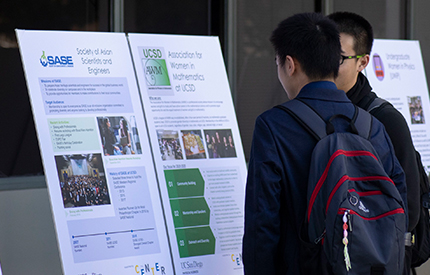Virtually Helping Students Succeed
August 18, 2020 | By Cynthia Dillon
Rapid response times help when it comes to managing a crisis—the coronavirus pandemic is proof of that. To respond quickly and nimbly requires strategy, planning and implementation. Adaptability helps, too. These are approaches practiced by the Division of Physical Sciences’ new Student Success Center in response to the coronavirus pandemic.
“The Center,” as it is called colloquially, is a new resource for physical sciences students. Located in Mayer Hall, it opened its doors in February 2020, only to have them closed a few weeks later when campus shut down for protection against COVID-19. While some organizations and businesses have struggled to adapt during the pandemic, The Center has found ways to thrive.
 Students, staff, faculty, alumni and industry partners participate in The Center’s virtual programs and events. This is a screenshot from a recent “Teaching Students of Color in STEM” webinar. Photo courtesy of Tina Gov, Student Success Center, Physical Sciences
Students, staff, faculty, alumni and industry partners participate in The Center’s virtual programs and events. This is a screenshot from a recent “Teaching Students of Color in STEM” webinar. Photo courtesy of Tina Gov, Student Success Center, Physical Sciences
“We are making great efforts to adapt to the changing circumstances so that our service to students continues despite these challenging conditions,” said The Center’s Faculty Director and Professor of Chemistry & Biochemistry Thomas Hermann, adding that providing a continued full online program of resources helps students who are anxious about how these difficult times will impact their job prospects and careers.
The Center’s efforts are anchored by events and programs designed to give students a leg-up on making career choices and developing the connections and skills they need to succeed in the world beyond college. According to Hermann, The Center’s leadership, which includes Director Franklin Garrett and Assistant Director Tina Gov, has combined available technology for virtual events and live audience engagement with student group and community partner involvement to remain true to the mission of its service to students.
One responsive approach the team took—amidst not just the pandemic but the recent civil unrest—was to help revive the Society for the Advancement of Chicanos/Hispanics and Native Americans in Science (SACNAS) chapter at UC San Diego, with support from the Division of Physical Sciences and in partnership with the Jacobs School of Engineering, and the Graduate Division.
“I am honored to serve as one of the staff advisors to SACNAS and to play a role in reestablishing the chapter at UC San Diego.” said Garrett, noting that The Center partners with the chemistry & biochemistry, mathematics and physics departments in providing an operating budget and infrastructure support for 15 student organizations and three campus diversity organizations that support physical sciences students.
Virtual Mentoring
To nurture its new programs, The Center hosts both live and pre-recorded events combined with live Q & A sessions online. These methods enable it to deliver its signature Mentorship Program, which was in its infancy when the pandemic hit. With the leadership of Dean Steven Boggs, Hermann, who also serves as associate dean of education and students for the division, and the Dean’s Leadership Council (DLC), program strategy and planning continued until the program started in June.
“Planning for this program has been in place since the idea of The Center began. With the onset of shutdowns due to the pandemic, we decided to establish this program on an accelerated timeline,” said Hermann, adding that student programs fail when expectations are not met and they become disappointed. “Our plan was to cultivate a good base of mentors during winter quarter, but then COVID came around and we had to rise to the challenge and quickly start a pilot mentoring program.”
He explained that he worked with his co-leaders at The Center, with the division’s Alumni Director Kimberly Peters and with the division’s development team, as well as faculty, to carry on with recruiting mentors, taking extra care to make good matches. Hermann reached out to his contacts in industry and government agencies to rapidly add and recruit mentors. Peters, who had mentor-program experience at another university, helped Hermann develop a mentoring contract that each party—students and mentors—signs. It clearly outlines guidelines and expectations of the program, setting everyone up for success. To date, Hermann said that The Center has 40 mentors, a third of whom work with two students, so over 50 mentor-mentee groups are connected, with more mentors and students coming on board.
Online Industry Days
Also among The Center’s repertoire of programs are Industry Day Events. These are part of industry outreach efforts responding to the fact that about 80 percent of physical science students ultimately work in industry after graduation. These networking and recruitment events offer students, who might understandably be anxious about employment right now, the opportunity to learn up-to-date information about hiring goals and practices in industry, career talks or specific companies in discipline-relevant areas including pharma, chemistry & biotechnology, materials & semiconductors, defense, cyber security, data science and finance mathematics.
 Student Robert Ramirez (left) greets Alumna and Dean’s Leadership Council Chair Lois Yu. Photo by Michelle Fredricks, UC San Diego Physical Sciences
Student Robert Ramirez (left) greets Alumna and Dean’s Leadership Council Chair Lois Yu. Photo by Michelle Fredricks, UC San Diego Physical Sciences
As part of that program—with its inclusive approach to serving all physical sciences students—The Center recently held the first industry day devoted to mathematics students who are interested in careers outside of academia.
“This is historically significant because we haven’t held an event like this specifically for math students before and because math is such a large major on campus,” said Assistant Dean of Physical Sciences Rob Rome.
The Center also hosts Single Company Recruiting Events. An example of a recent program featured Catalent Pharma Solutions, a multinational company with a footprint in San Diego that provides drug development services for Pharma companies and looks to hire UC San Diego students for internships and regular jobs.
“Students can send in their resumes and CVs ahead of the event, and the company brings its whole team of recruiters—this occurs virtually,” noted Hermann.
Other featured companies include General Atomics, a large local energy and defense corporation, Lam Research, a developer and manufacturer of equipment for semiconductor fabrication in the Bay area, Vertex Pharmaceuticals, a large biotech company in Boston with a research site in San Diego, and BioLegend—a San Diego company that develops antibodies and reagents for research. Representatives from these companies have interacted with students during online networking and recruiting events since May and continuing over the summer.
Herman said that companies and individuals who participate in the Industry Day Events also support The Center in other ways; for example, through financial support to the Undergraduate Summer Research Award (UGSRA). This is a program by which several undergraduates work on a specific research topic under the guidance of a faculty member. At the end of 10 weeks, the student researchers present their projects during a poster session. The UGSRA was initially launched with the generous support of alumnus Bill Lee, an executive at Gilead Sciences, who provided funding for 15 fellowships over multiple years. Lee’s example is now followed by General Atomics, which gave $75,000 to sponsor 10 physics students this year, and Alumnus Jeff Marks, of Lam Research, who contributed funds to support four additional students.
Job Hunting Webinars
“We’ve also developed a third type of event, “Job Hunting in the Age of COVID-19,” said Hermann, who conceived the program. “This is a synchronous webinar program with speakers giving talks about their educational and professional backgrounds and then addressing questions from the audience of student participants—many who ask about job prospects and the hiring process during the pandemic. The two events we held so far were well-received, and we are planning to make this a regular series,” he said, adding that the majority of industry professionals and other speakers recruited for these events are alumni of U San Diego physical science programs who enjoy the opportunity to share their experiences with new generations of students.
Currently, The Center staff has a packed schedule of upcoming Pharma and Biotech job-hunting programs, as well as an upcoming event featuring speakers giving career advice for aspiring mathematicians and physicists.
 Students check out a poster on display during The Center’s opening event. Photo by Michelle Fredricks, UC San Diego Physical Sciences
Students check out a poster on display during The Center’s opening event. Photo by Michelle Fredricks, UC San Diego Physical Sciences
“We are also developing a program we call ‘Typical Company/Atypical Career,” said Hermann, adding that the program includes a planned event that serves students who are military veterans. “These are mainly project management opportunities for individuals who combine a science background with proven ability to organize and lead teams.”
Another show of The Center’s nimble and timely responsiveness is the development of a program focused on careers in STEM teaching. Hermann said that his team is working with the CalTeach program to organize two events in the fall. The events will connect seasoned educators and education administration students with students interested in careers in K-12 education and the California community college system. CalTeach, housed in the Division of Physical Sciences, works to meet California’s ongoing need for secondary science and mathematics teachers.
The Center’s timeliness is also apparent in a recent webinar it offered called, “Teaching Students of Color in STEM.” Hosted in collaboration with the Graduate Division and Jacobs School of Engineering, the workshop was part of "Woke: A Series in Solidarity with People of Color in STEM." It featured panelists Sekhar Chivukula , a distinguished professor of physics; Dontarie Stallings, assistant teaching professor of chemistry and biochemistry; Jelena Bradic, associate professor of statistics; Ioana Dumitriu, professor of mathematics and Tod Pascal, assistant professor of nanoengineering and chemical engineering.
In partnership with the Division of Physical Sciences’ development team, The Center recently hosted an online information event for parents of students. The event addressed parents’ concerns about their children’s job opportunities and explained the resources The Center provides to students and the ways they can access the resources during this pandemic.
Robert Ramirez, a fourth-year pharmacological chemistry student, is one on of many students who is benefitting from the professional development opportunities that the Center offers. Ramirez is a recipient of the 2019 UGSRA and a participant in The Center’s mentorship program who recently secured an interview for an internship at Catalent Pharma Solutions. He learned about the internship opportunity at the Catalent Pharma Solutions recruitment event hosted by The Center.
“This investment in the Student Success Center will make a positive impact on the future doctors, engineers, scientists and business people who will graduate from UC San Diego,” said Ramirez, adding that he was thrilled when he heard about the new center because he knew it would open many more doors for internships and employment opportunities.
“The Student Success Center offers a turning point for the division as we look for impactful ways—outside the classroom—to support our students’ academic and career success,” said Dean Steven Boggs.
